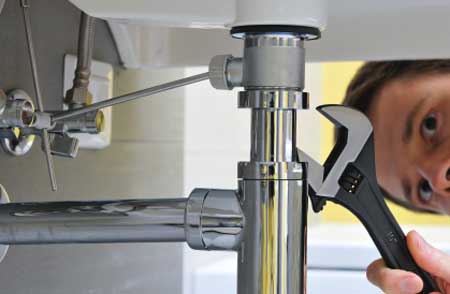The world of plumbing has many obstacles and hazards. When it comes to tackling plumbing projects yourself at home, experience is key. With plumbing systems even a slight miscalculation or error in judgment can be a costly mistake. In the worst scenarios, errors can be very destructive as well. For complex plumbing projects for which you have little experience, it is often better to resign to pay and call a professional plumber. If things go wrong doing the job yourself, you could end up paying a lot more to fix the problem and damage you caused than a plumber costs.

DIY plumber in action – courtesy of bestplumbingofca.com
Some home plumbing maintenance is routine and can be easily resolved with the right tools and a little time reading some tutorials. Other issues like running new pipes, messing with the water heater, or dealing with a severe leak may be best left to a professional with the experience to make the fix right the first time. When you’re weighing whether or not to take charge of a plumbing problem yourself or call an expert, heed the experiences of those who have tried and failed.
The most common mistakes made by DIY plumbers is severing a pipe, worsening a clog, and causing a flood out of nowhere. Many problems involving plumbing fixtures and pipes are worsened by senseless tinkering. Still more are simply caused by ignorance and bad decisions. Sometimes there was never a real problem until someone wanted to adjust or replace something. What appears to be a routine fix or a minor adjustment turns into a nightmarish scenario of gushing water, or worse yet, sewage. The worst plumbing horror stories involve torrents of water and waste. From a ruptured sewage line to a backed up drain that brings waste water up through the drain and into your shower, plumbing is dirty work and problems are unavoidable.
Clogged drains and leaking pipes are the root of many DIY plumbing horror stories. Likewise, these are two problems that don’t necessarily require any tampering to occur. Old, weak pipes can burst and drain clogs build and build until one day you find a pond where your bathroom floor used to be. During the transition from one season to another, such as winter to spring, pipes can burst due to changes in water pressure and temperature. This is also a common problem during the winter when pipes can freeze and then burst when water surges through them. Many home floods are attributed to ruptured pipes, particularly in basements.
Similarly, issues involving a backed up sewage line or clogged drains can be equally devastating. Some of these issues are out of your control, but many result from negligence or poor maintenance of home plumbing systems. Neglecting to regularly clean out your drains and inspect how your drains clear can cause clogs to develop over time. Sometimes just doing this can prevent a larger issue from developing. The health of the pipes themselves can be a little more difficult to assess, but monitoring them for leaks is one of the best ways to stay aware of how they are performing. Taking an interest in your plumbing at home and sensibly using your drains can help prevent you from becoming a participant in a plumbing horror story. In the event you would encounter such, don’t hesistate to call http://www.drdrip.com.au/blog/
Author Bio:
+Ben Vaughn, writes on home plumbing system maintenance, central air Utah, and tips for conserving water.